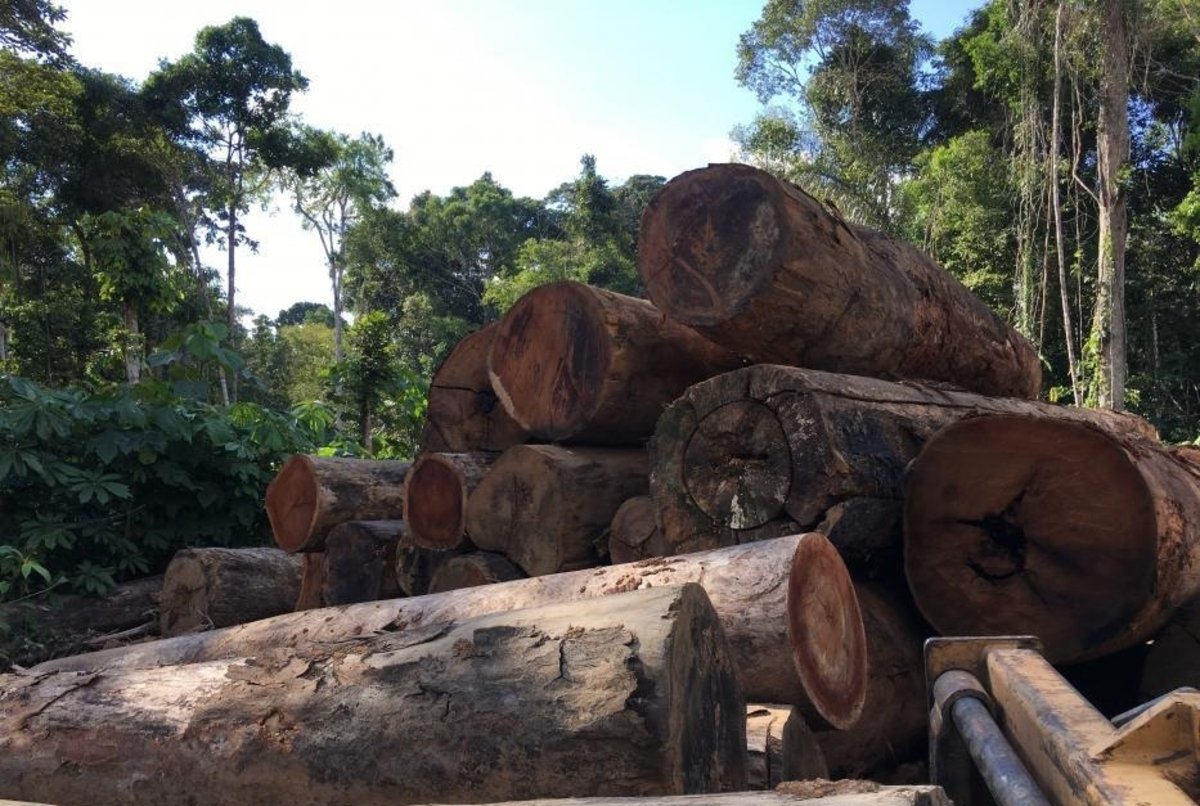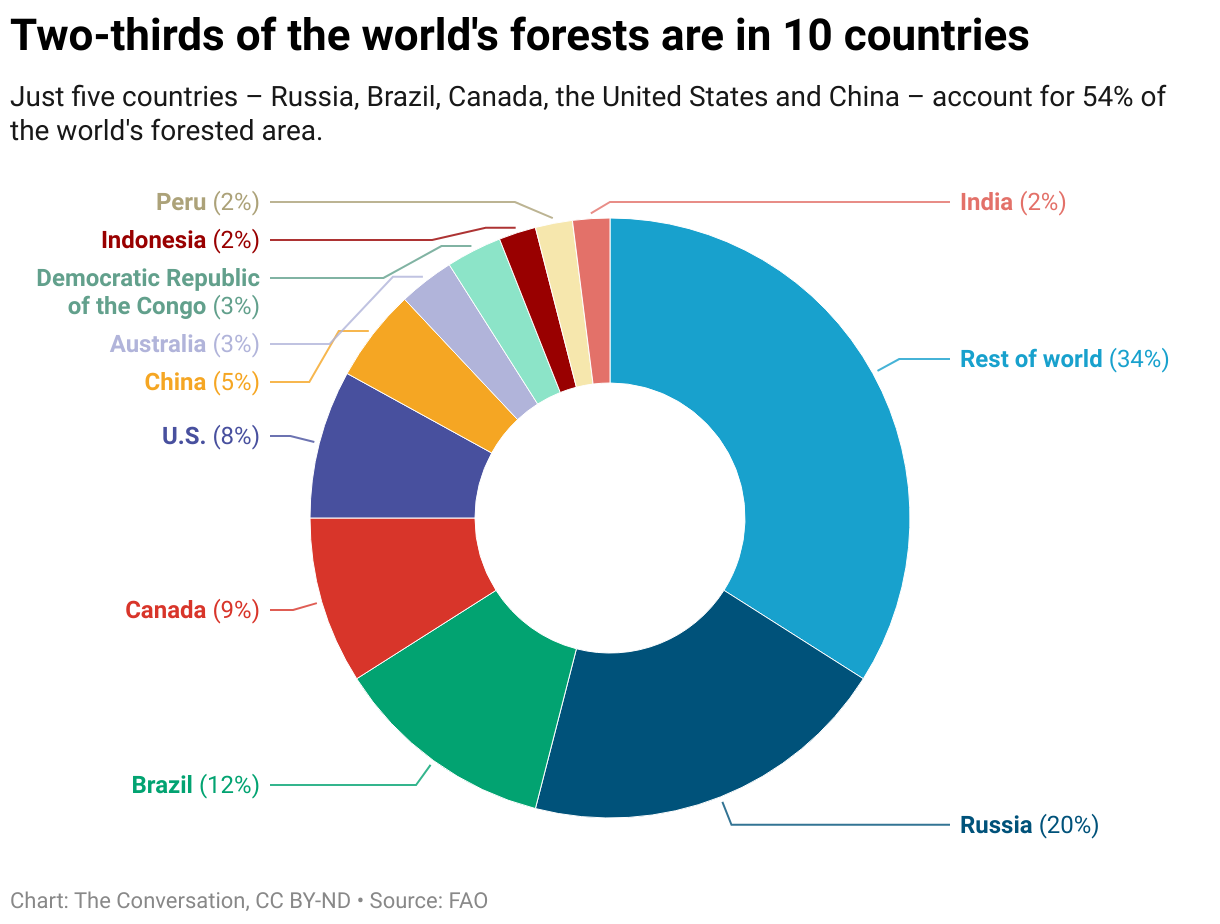Organized Crime Helps Drive Environmental Devastation In the Tropics

As one of the largest timber importers in the world, the US represents a lucrative market for illegal suppliers. Preventing illegal shipments from entering the US cuts off a major revenue stream for transnational criminal organizations. Customs and Border Protection photo.
Every year the world loses an estimated 25 million acres (10 million hectares) of forest, an area larger than the state of Indiana. Nearly all of it is in the tropics.
Tropical forests store enormous quantities of carbon and are home to at least two-thirds of the world’s living species, so deforestation has disastrous consequences for climate change and conservation. Trees absorb carbon dioxide as they grow, slowing its buildup in the atmosphere – but when they are burned or logged, they release their stored carbon, fueling further warming. Tropical forest loss generates nearly 50% more greenhouse gases than does the global transportation sector.
At the 2021 U.N. conference on climate change in Glasgow, more than 100 world leaders pledged on Nov. 1 to halt deforestation by 2030. In the Declaration on Forests and Land Use, countries outlined their strategy, which focuses on supporting trade and development policies that promote sustainable production and consumption. Governments and private companies have pledged over US$19.2 billion to support these efforts.
From my research on social and environmental issues in Latin America, I know that four consumer goods are responsible for the majority of global deforestation: beef, soy, palm oil, and wood pulp and paper products. Together these commodities are responsible for the loss of nearly 12 million acres (5 million hectares) annually. There’s also a fifth, less publicized key driver: organized crime, including illegal drug trafficking.
The dominant role of beef
Among major products that promote deforestation, beef is in a class by itself. Beef production is now estimated to be the biggest driver of deforestation worldwide, accounting for 41% of global forest losses. In the Amazon alone, cattle ranching accounts for 80% of deforestation. From 2000 to 2011, beef production emitted nearly 200 times more greenhouse gases than soy, and 60 times more than oil palm in tropical countries with high deforestation rates.
Beef is produced in many countries, but it mainly drives forest losses in Latin America. On the savannas of sub-Saharan Africa and the plains of the U.S. Midwest, cattle graze without directly contributing to deforestation.
However, beef production in these regions indirectly contributes to deforestation by increasing demand for soy-based feed. Cattle production worldwide also drives climate change because cattle emit methane, a potent greenhouse gas.
? Unregulated cattle ranching, logging & coca farming not only fuel deforestation and lead to natural disasters and droughts in #Colombia, they also feed crime and finance armed groups.
@BramEbus traveled to deforestation hotspots in the ?? #Amazon to find out more. ? pic.twitter.com/onbavvMU5j— Crisis Group (@CrisisGroup) November 15, 2021
Soy and palm oil: Ubiquitous ingredients
Together, soy and palm oil drive nearly 10% of deforestation annually – almost 2.5 million acres (1 million hectares).
Clearing land for palm oil plantations fuels large-scale rainforest destruction in Indonesia and Malaysia, where most of the world’s palm oil is produced, destroying habitat for endangered and threatened species such as orangutans, elephants and tigers. More recently, palm oil production has expanded to other parts of Asia, Central and South America and Central and West Africa.
Palm oil is the most commonly produced, consumed and traded vegetable oil. Some 60% of the 66 million tons produced globally every year is used to produce energy in the form of biofuel, power and heat. About 40% is used for food, animal feed and chemical products. Palm oil is an ingredient in half of all products found at the supermarket, including margarine, shampoos, frozen pizza and detergents.
Soy production has doubled globally in the past 20 years. Nearly 80% of global soy is fed to cows, chickens, pigs and farmed fish. This demand reflects the tripling of global meat production over the past 50 years.
The remaining soy is largely used to produce vegetable oil and biodiesel. Humans directly consume just 6% in the form of tofu, soy milk, edamame and tempeh.
The United States and Brazil produce nearly 70% of the world’s annual 350 million-ton soy crop. Brazil has rapidly caught up to U.S. production in the past 30 years, with disastrous consequences for tropical forests in the Amazon.
Wood products
Wood products are responsible for about 5% of annual global deforestation, or about 1.2 million acres (500,000 hectares) yearly. Wood is widely used for home construction and furniture, and also as a pulp source for paper and fabric. And in low-income nations and rural areas, it’s an important fuel source for heating and cooking.
The three largest paper-producing countries are the U.S., Canada and China, but tropical countries have also become important pulp and paper sources. Timber plantations account for a growing share of tropical wood products, but there’s disagreement about whether this approach is more sustainable than logging natural forests. In Indonesia between 2001 and 2016, more forests were cleared to create wood product plantations than for palm oil production.
Illegal deforestation and organized crime
Making the supply chains for these four commodities more sustainable is an important strategy for reducing deforestation. But another industry plays an important role, especially in tropical forests: organized crime. Large, lucrative industries offer opportunities to move and launder money; as a result, in many parts of the world, deforestation is driven by the drug trade.
In South America and Central America, drug trafficking organizations are the vanguard of deforestation. Drug traffickers are illegally logging forests in the Amazon and hiding cocaine in timber shipments to Europe. In my research, I have analyzed how traffickers illegally log and raise cattle in protected areas in Central America to launder money and claim drug smuggling territory. Other scholars estimate that 30% to 60% of deforestation in the region is “narco-deforestation.”
Legal and illegal activities also interweave along the commodity chains for palm oil and soy. Forest Trends, a U.S. nonprofit that promotes market-based approaches to forest conservation, estimates that nearly half of deforestation for commercial products like cattle, soy, palm oil and wood products is illegal. According to the group’s analysis, exports tied to illegal deforestation are worth US$61 billion annually and are responsible for 25% of total global tropical deforestation.
'Narco-deforestation' study by Oregon State University links loss of Central American tropical forests to cocaine pic.twitter.com/HG9AD0Zjo1
— Global Drug Policy Observatory (@Gdpo_Swan) May 17, 2017
Not all large-scale illegal deforestation is linked to drug trafficking organizations. But it is almost always tied to organized crime that depends upon corruption to operate.
Promoting sustainable production and consumption are critical to halting deforestation worldwide. But in my view, national and industry leaders also have to root organized crime and illicit markets out of these commodity chains. Until they do, global pledges to halt deforestation will have limited effect.
This story appeared first in The Conversation on Nov. 15, 2021. The Conversation is a community of more than 135,400 academics and researchers from 4,192 institutions.
Read next: $1 Million In ‘Floating Gold’ – Inside the Black Market Whale Poop Trade

Coffee or Die is Black Rifle Coffee Company’s online lifestyle magazine. Launched in June 2018, the magazine covers a variety of topics that generally focus on the people, places, or things that are interesting, entertaining, or informative to America’s coffee drinkers — often going to dangerous or austere locations to report those stories.
BRCC and Bad Moon Print Press team up for an exclusive, limited-edition T-shirt design!
BRCC partners with Team Room Design for an exclusive T-shirt release!
Thirty Seconds Out has partnered with BRCC for an exclusive shirt design invoking the God of Winter.
Lucas O'Hara of Grizzly Forge has teamed up with BRCC for a badass, exclusive Shirt Club T-shirt design featuring his most popular knife and tiomahawk.
Coffee or Die sits down with one of the graphic designers behind Black Rifle Coffee's signature look and vibe.
Biden will award the Medal of Honor to a Vietnam War Army helicopter pilot who risked his life to save a reconnaissance team from almost certain death.
Ever wonder how much Jack Mandaville would f*ck sh*t up if he went back in time? The American Revolution didn't even see him coming.
A nearly 200-year-old West Point time capsule that at first appeared to yield little more than dust contains hidden treasure, the US Military Academy said.














